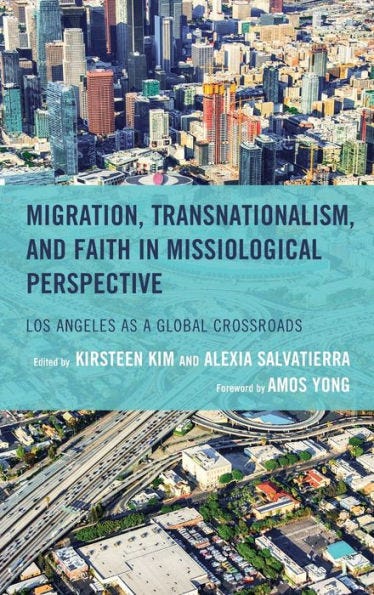Welcome to “Global Witness, Globally Reimagined.” You get a glimpse here of the kind of work that I do both at Church Mission Society and Missio Africanus where I help students of all levels (from unaccredited courses to PhD) explore the theological (and missiological) implications of the rise of World Christianity. In the newsletter, I focus on the subject of global witness in the context of the twenty-first century. Every Thursday, I share a thought that has spoken to me in the week, one or two resources that I trust will be helpful to you, and three exciting quotes about mission to give you something to think about as you go through your day. I pray one of these will energise you.
NB: Please note that I will soon start tailoring most of my content towards paid subscribers. There will still be occasional posts open to everyone, but most will be for paid subscribers. If you appreciate the newsletter and are able to pay for a subscription, please consider doing so.
1. Thought I Can’t Shake Off
Back when I studied in the UK, before I moved to the US, I read a book by Sara Savage entitled Making Sense of Generation Y: The World View of 15- to 25-Year-Olds (published in 2006). It shifted my understanding of the West in ways I appreciate today almost 20 years later. I read it after having lived in the German-speaking countries for a few years. As such, I had seen what a post-Christian Europe (or a pre-revival Europe, as some of my friends have started calling it), looks like and had started to wonder about the idea that there was a large spiritual hunger out there that would draw people back to the church. Having grown up in a revival in Malawi (a country that has a very young population — more than half its population is younger than 20), I found Savage’s explanation of the worldview of the British “Generation Y” fascinating. This was largely because the worldview of many young Africans is quite different from that of their Western counterparts.
For instance, while many African youth are committed church-goers — the median age of African Christians is 18 years — British young people do not think of church as a place to go to for their spiritual needs. In a Times article entitled “Church Seeks Spirituality of Youth … and Doesn’t Like What It Finds,” Ruth Gledhill added that “the younger generation shows signs of deep spiritual hunger but rather turns to kaballah and other “gothic traditions” because the church is not ready to meet it” (I am paraphrasing an old article that I cited in my thesis but whose like is now dead).
I bring this book up for three reasons. First, the “Generation Y” of Sara Savage’s book are now middle-aged adults and like many in that age group, they are not in church. Second, I am inclined to believe that spiritual hunger does exist among them, somewhere out there but I do not see it (maybe I am looking in the wrong places). In addition, if it is there, I think Ruth Gledhill is right, “the church is not ready to meet it.” Third, I visited a Zimbabwean friend’s church that is entirely focused on reaching the spiritually hungry people in the UK. It has been going on for three years and has successfully attracted an interesting mix of Africans (some of whom have become followers of Christ in the UK). He is stretching the vision now to try and reach spiritually hungry British people. I look forward to observing the journey. How will he find these spiritually hungry British people? How will he engage them to be part of his church community? What kinds of spiritual needs do they have and how will he meet them?
All in all, I wonder if the Africa church (and other such churches) will be able to meet the spiritual needs of Westerners. I hope they will, but I think it will take a lot of hard work.
2. Resources I am Enjoying
Book: Kirsteen Kim and Alexia Salvatierra, (eds.) Migration, Transnationalism, and Faith in Missiological Perspective: Los Angeles as a Global Crossroads, (Lanham: Fortress Academic, 2022).
This fascinating resource emerged from the 2020 Missiology Lectures at Fuller Theological Seminary, US. It brings together various scholarly voices to explore the implications of migration in global hubs (with the city of Los Angeles as a case study of a melting pot of migrant Christian communities). Various authors examined the relationships between faith and migration through sociological, theological and missiological lenses. The volume advances a mission theology of migration and proposes missiological praxis and engagement that can mitigate the adaptive challenges occasioned by involuntary migration and unfair immigration policies and systems. As such, the book is a brilliant addition to the bodies of knowledge on mission and migration, highlighting the important correlation between the two and the implications of that connection particularly for how we engage in mission today.
You may find this panel discussion exciting.
3. Quotes I am Pondering
Mission that does not take the life-giving dimension of salvation in the present seriously often slides into tragedy. — David Tonghou Ngong
By imbibing into its symbolic and cultural life, the living institutions of the people’s way of life, there will be the elimination of the offensive practice of Christians being divorced from their own culture. The Church will then turn out to be the spiritual force from which those cultural institutions acquire new creativity. — Mary Kristel Grace Chinyere Nwuba
Like the multicolored clothes of Joseph, the Church of God should be seen as exhibiting a mosaic of cultural responses, none superior to the other, but all seen as grateful and valid responses to God who calls. — Jones Ugochukwu Odili
I pray that you will be faithful to the work God has for you this week.




